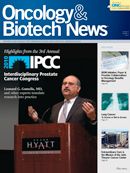International Survey Asks Oncologists What They Value in a Pharmaceutical Company
Kantar Health Research recently conducted an Internet survey of approximately 250 oncologists from the United States, France, Germany, Italy,Spain, and the United Kingdom. Using a proprietary scoring system Kantar Health calls the TRI*M Index, the research firm assessed relationships between physicians and pharmaceutical company representatives.
Kantar Health Research recently conducted an Internet survey of approximately 250 oncologists from the United States, France, Germany, Italy, Spain, and the United Kingdom. Using a proprietary scoring system Kantar Health calls the TRI*M Index, the research firm assessed relationships between physicians and pharmaceutical company representatives. Kantar also asked oncologists to rank the 16 leading pharmaceutical companies on 8 attributes, including representative conduct; representative knowledge and expertise; quality and value of visit; programs for patient management, education, and support; physician education and information services; practice and staffsupport services; Web-based information services for physicians; and Web-based information services for patients.
Oncologists in the United States, the United Kingdom, Germany, France, and Spain rated Roche/Genentech highest for customer retention at 90 (out of 100), while Italian oncologists picked Novartis for the top spot. Novartis came in second overall with a TRI*M score of 80. Ian Hicks, senior vice president for Kantar Health, attributed the high marks for these two companies to their “sustained investment in their oncology business units.” Sanofi-Aventis and Celgene tied for third with 76 points each, followed by Amgen with 73, and Eli Lilly/ImClone with 72. Cephalon and Takeda/ Millennium tied for the bottom spot, with 58.
Oncologists overall considered a sales representative’s personal and professional conduct as the most important asset, followed by the representative’s knowledge and expertise. Third on the list of most desirable attributes was “quality and value of a sales representative’s visits,” and fourth was “physician education and information services.”
The Kantar Health survey noted variation among different nationalities of oncologists. For example, US oncologists were the only ones to rank practice and staffsupport services as equal in importance to the quality and value of a sales representative’s visits. Italy’s oncologists were the only group to select physician education services as the most important quality. Oncologists in Germany were the only ones not to select a representative’s conduct as one of the 3 most preferred attributes.
According to the survey, oncologists responded that services for patients were increasing while services for physicians and their staffwere decreasing. The oncologists identified support programs targeting practitioners as more important than ones targeting patients and staff. Web Services for patients was rated the least desirable of the 8 attributes.
